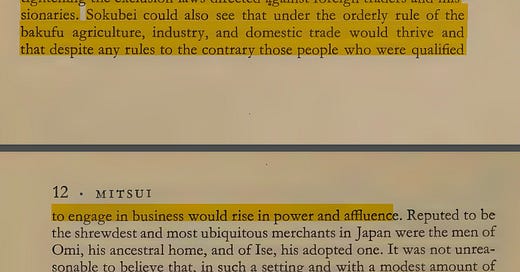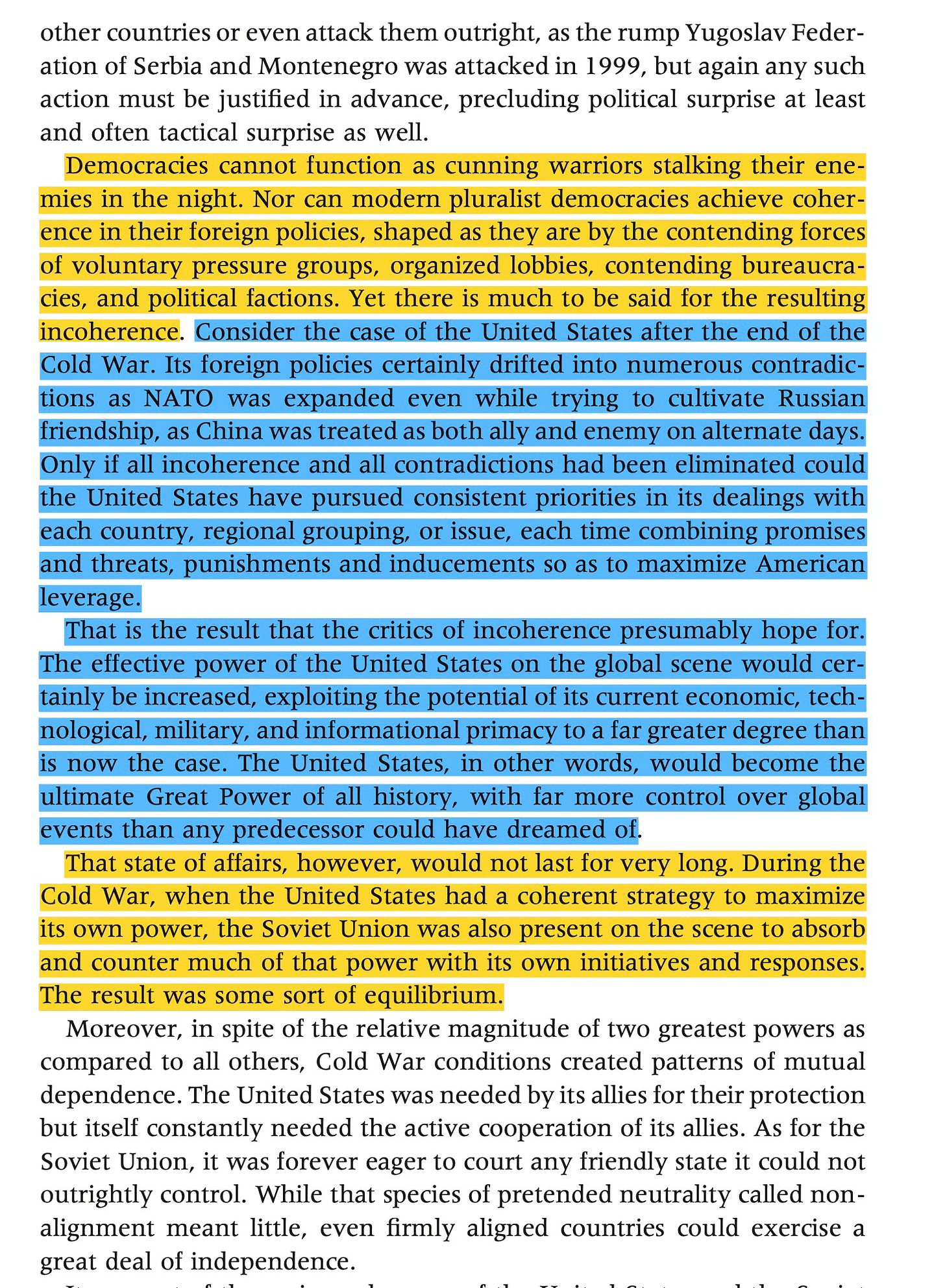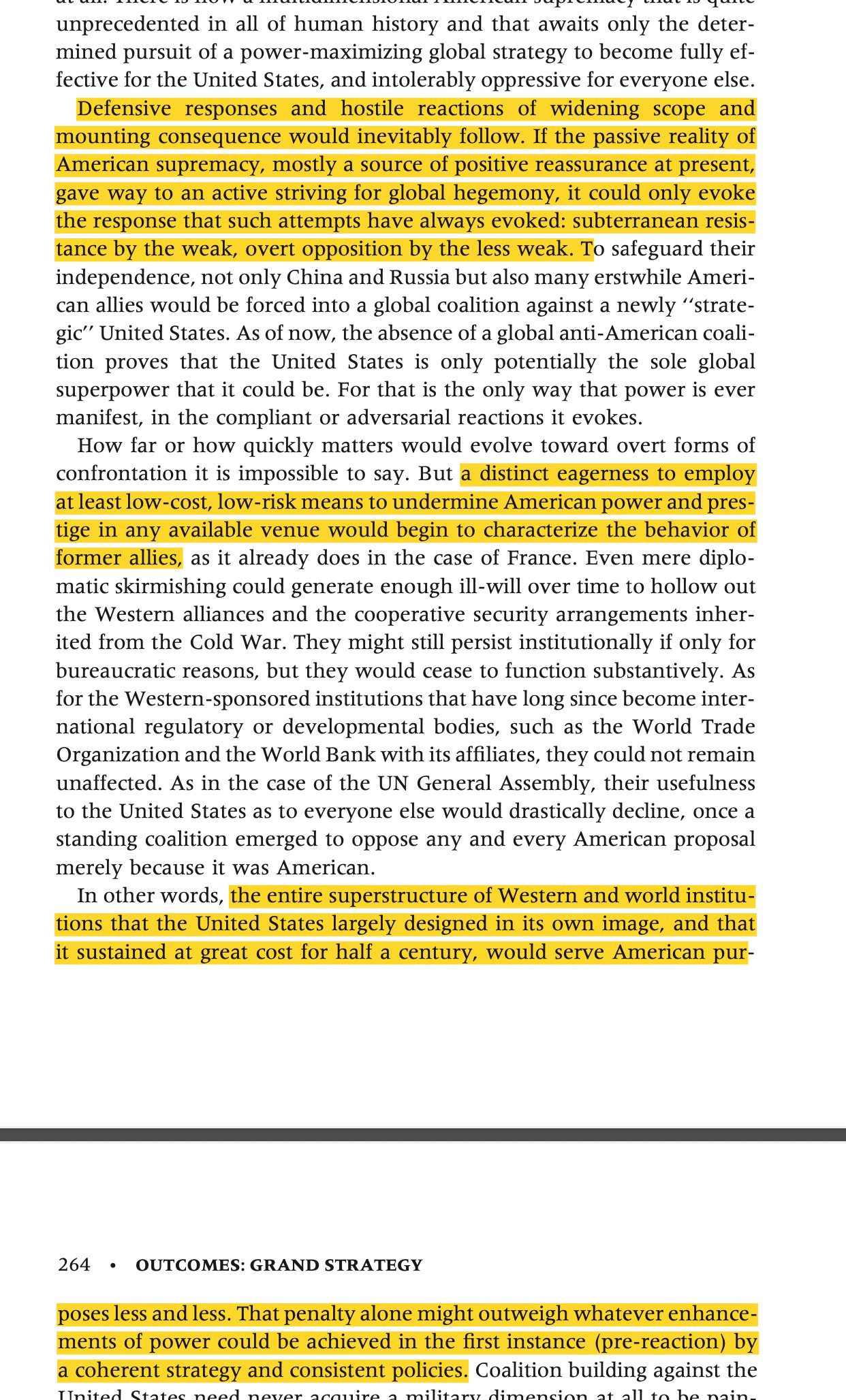Bolds I particularly enjoyed, and bold stars were my favorites. All books I’ve read at least half of.
This is my last book wrap-up pre-parenthood — let’s hope the next one isn’t too much thinner!
Books
Japan
I covered lots of Japan books, including The Pillow Book, some Zen classics, and a little bushido in this post, which was my favorite of the year so far.
Japan Notes
I recently spent two weeks in Japan. I deeply enjoyed again being on the steep part of a regional learning curve like when I first moved to China. What follows are notes from my travel and reading. We start off with some semis, then get into Kyoto eating, Zen Buddhism, “the way of the samurai,” and even some Shibuya-kei.
The following are ones I didn’t get to.
*Mitsui Empire: Three Centuries of Japanese Business, John Roberts (1973). Majestic history of a family and institution that doubles as the best political economy book I’ve read about Japan.
Some favorite moments: when the family patriarch makes the ultimate “bet on yourself” move by disowning his class status as a samurai in the early 1600s because he saw Japan stabilizing. Even though merchants were still discriminated against, he knew that power and status in the future would come from trade, and was confident he could pull it off.
Smuggling cash necessary for the Meiji army to stay afloat by pretending they’re drunk aristocrats on a pleasure cruise!
Here’s a thread with more. The only knock is that it ends with a whimper — there wasn’t enough meat in the postwar years. 9.4.
Emperor of Japan: Meiji and His World, 1852-1912, Donald Keene (2002). Far too long and weirdly not compelling. It must be hard to do a biography of someone with such an overwhelming amount of source material but so little insight into his interior life. Was Meiji the most boring part of the Meiji era? Wish I invested this time reading a biography of one of the reformers or counter-revolutionaries instead.
The Life-Giving Sword, Yagyu Munenori (1632). The introduction and backstory was cooler than the book itself — who wouldn’t want to learn the secrets of the swordmaster who taught shoguns? It has some interesting Zen tidbits and reflections on flow-state, but otherwise a bit of a “you had to be there” vibe, as someone who isn’t deeply steeped in samurai swordsmanship.
Here’s a cool origin story of how Munenori’s dad found his most important teacher:
This “sneaking into the danger zone” concept is relevant across all martial arts.
And this was an interesting reflection on flow state:
Ed Luttwak
Strategy: The Logic of War and Peace, Ed Luttwak (1987). Book-review thread here. One snippet: I like his conclusion that the US being a messy democracy — and as such not doing everything it could to coherently maximize national power — paradoxically has allowed it to maintain its alliance network through the end of the Cold War, because America’s mess makes it less threatening.
*The Grand Strategy of the Byzantine Empire, Ed Luttwak (2009). A convincing case for the Byzantines as underappreciated strategic geniuses. A few selections from his closing pages gives a sense of their operating model that sustained Constantinople for a millennium:
The Endangered American Dream, Ed Luttwak (1993). A bit of a historical anachronism (the big bad here is Japan) — but Luttwak was thirty years early to the renewed realization that domestic manufacturing capacity is central to national power.
I loved this riff on Americans’ commitment to free trade as akin to a Marxist-Leninist ideology:
What horrific event will it take to get us to marvelous cohesion again?
He had some good riffs on what the US should learn from MITI:
The talent that the CHIPS Act was able to pull in proved this point:
History of the US Civil Service, Paul P. Van Riper (1958). Why are there so few histories of the administrative state? This is the standard text, and no one has taken a second swing at it since Italian scholar Lorenzo Castellani’s History of the US Civil Service (2021). I’m halfway through this epic — lots more to come on this theme. Most striking to me so far was how the progressive movement that finally started to clean up the patronage system was deeply religiously inflected.
When the Chips Are Down: A Deep Dive into a Global Crisis, Pranay Kotasthane and Abhiram Manchi (2023). Covered below:
England
A History of Britain — Volume 2: The British Wars, 1603-1776, Simon Schama (2001). Is Schama most stylish historian of his generation? I came in knowing next to nothing about the lead-up and aftermath of the Glorious Revolution, and this was as fun and engaging an introduction as I could hope for.
A History of Britain — Volume 3: The Fate of Empire 1776-2000, Simon Schama (2002). The quality didn’t dip, but it was less fun for me than Volume 2, just because more of it was familiar. Lost interest with the Victorians.
The Subjection of Women, JS Mill (1869). Passionately, personally argued. One of Schama’s best chapters was on the love story between Harriet Taylor and JS Mill that ushered this into existence in the first place. The essay still sparkles today, but half the pleasure in reading this is trying to imagine how it must have landed in 1869.
It would be tiresome to repeat the commonplaces about the unfitness of men in general for power, which, after the political discussions of centuries, every one knows by heart, were it not that hardly any one thinks of applying these maxims to the case in which above all others they are applicable, that of power, not placed in the hands of a man here and there, but offered to every adult male, down to the basest and most ferocious. It is not because a man is not known to have broken any of the Ten Commandments, or because he maintains a respectable character in his dealings with those whom he cannot compel to have intercourse with him, or because he does not fly out into violent bursts of ill-temper against those who are not obliged to bear with him, that it is possible to surmise of what sort his conduct will be in the unrestraint of home. …
Surely, if a woman is denied any lot in life but that of being the personal body-servant of a despot, and is dependent for everything upon the chance of finding one who may be disposed to make a favourite of her instead of merely a drudge, it is a very cruel aggravation of her fate that she should be allowed to try this chance only once. The natural sequel and corollary from this state of things would be, that since her all in life depends upon obtaining a good master, she should be allowed to change again and again until she finds one. I am not saying that she ought to be allowed this privilege. That is a totally different consideration. The question of divorce, in the sense involving liberty of remarriage, is one into which it is foreign to my purpose to enter. All I now say is, that to those to whom nothing but servitude is allowed, the free choice of servitude is the only, though a most insufficient, alleviation. Its refusal completes the assimilation of the wife to the slave—and the slave under not the mildest form of slavery: for in some slave codes the slave could, under certain circumstances of ill usage, legally compel the master to sell him. But no amount of ill usage, without adultery superadded, will in England free a wife from her tormentor.
Descent of Man, and Selection in Relation to Sex, Charles Darwin (1871). It’s no Origin of Species…
Life in Olden Times
The Ties That Bound: Peasant Families in Medieval England, Barbara A. Hanawalt (1986).
I recently had a good friend say to me, “With climate change, it’s hard to want to bring a kid into the world.” Anyone with that view should read some social history of literally any other time before 1950. It really, really sucked to not live in the modern world!
This was heartbreaking.
Albion’s Seed: Four British Folkways in America, David Hackett Fischer (1989). Tanner has a great essay on Fischer’s works.
Science Policy
Scene of Change: A Lifetime in American Science, Warren Weaver (1970). Review thread here. He’s an endearing character — in particular, I think the last chapter meditating on science and faith was lovely.
Would recommend reading Eric Gilliam’s review essay to get a sense of how big a deal what Weaver did with creating molecular biology was. He'‘s too modest in the memoir to appreciate how important his accomplishments were.
Long Tail Books
The Best Minds: A Story of Friendship, Madness, and the Tragedy of Good Intentions, Jonathan Rosen (2023). The only book that made it on the NYT and WSJ book-of-the-year lists!
*Lindbergh, A. Scott Berg (1998). Would love to get in touch with Scott Berg on the podcast.
Mastering the Art of Command: Admiral Chester W. Nimitz and Victory in the Pacific, Trent Hone (2022). Discussed here:
Eve: How the Female Body Drove 200 Million Years of Human Evolution, Cat Bohannon (2023). Made pregnancy and parenthood seem less scary. After all, there’s a few hundred million years of bugs that have been evolved away. I just wish it tried to be a little less “relatable” with the cutesy anecdotes.
How to Be a Founder: How Entrepreneurs can Identify, Fund and Launch their Best Ideas, Alice Bentinck and Matt Clifford (2022). Big takeaway: I’m a founder! Hadn’t really conceptualized what I’m doing here in ChinaTalk as that until reading this in preparation for my show with Clifford.
The Hollow Crown: Shakespeare on How Leaders Rise, Rule, and Fall, Eliot Cohen (2023). Cohen has a unique perspective relative to most who write about Shakespeare, and he gave me a great excuse to read some underappreciated plays (he gives a lot of love to Corolianus and Henry VI). The structure isn’t particularly clear — sort of runs through a career of a politician but also doesn’t, and it also jumps back and forth between different plays — but doesn’t take away too much from book as a whole if you look at it more like a series of essays. Saving this podcast for paternity leave it will be out soon!
Supernova Era, Liu Cixin (2003). Great premise and fantastically executed first half, completely loses it for me once he gets into this Lord of the Flies-y Arctic wargame. He just can’t write America that well. Interestingly, the thought experiment of the US and China populations just exchanging landmasses, I thought was dumb and not worth pondering — but it apparently resonated in China, with Bilibili videos clocking in at 2 million views.























The Unfettered Mind by Takuan Soho is a great companion read to Yagyu Munenori.
Finished Strategy by Luttwak a few months ago. Great read on the ideas of escalation and counter-productive methodologies, defining the enemy as dynamic, not static.